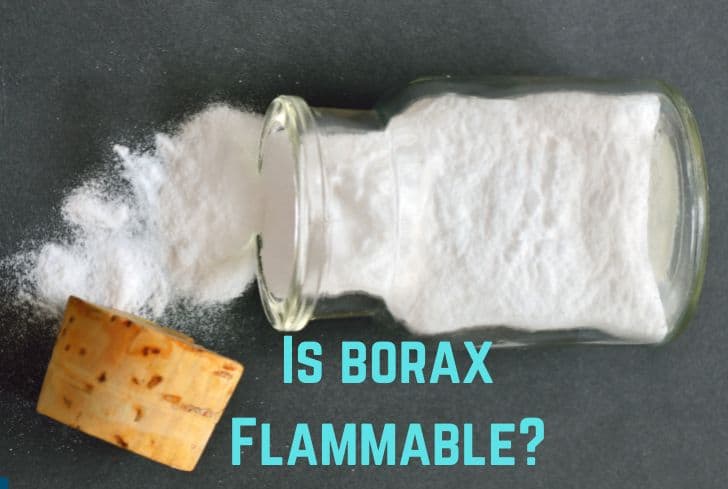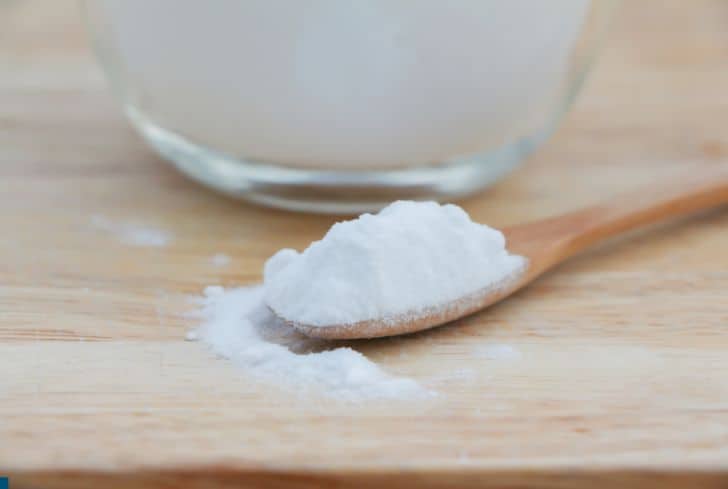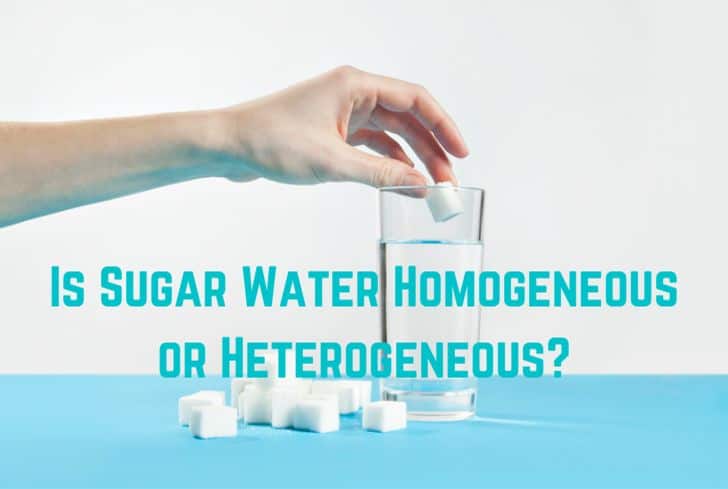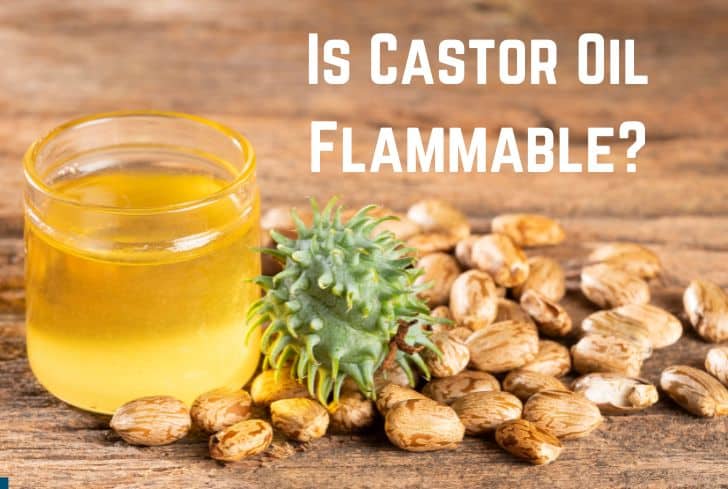Is Borax Flammable? (Is It Safe to Burn in Fire?)

Borax is a go-to ingredient when it comes to making cleaning products. Its flexibility goes from household products like paint and ceramic glaze, to even skin care products, mouthwashes, and toothpaste. Since Borax is a variant of sodium, which is a flammable liquid, people often wonder – is Borax flammable?
Sodium, as a solid is flammable and when wet, can even burst randomly and cause a violent reaction, letting out hazardous hydrogen gas. Hence, it is important to know about the kind of items you keep around the household and know if Borax will do the same with its sodium components. Read on to know more!
Is Borax Flammable?
Borax is not a flammable substance as it is a mineral that is naturally extracted from the ground. It is also used in the making of a lot of cleansing items like deodorizers, pesticides, detergents, and conditioners, so while it is toxic when ingested, it will not burn. However, it can burn if mixed with some other flammable chemicals, like acetone or alcohol.
The powder is also safe as it will not explode even when mixed with other chemicals. Being in its grained state, it does not really leave any room for combustion, despite being able to clear out nuclear waste.
So, despite having sodium as one of its main components, Borax is not flammable, combustible, or explosive and it is totally safe to keep around any source or flame.
Is It Safe To Put Borax in a Fire?
Even if sodium may be flammable, Borax by itself does not catch fire at all. In fact, it can even be used as a fire retardant. Hence, it is safe to put Borax in a fire, and even a common scientific experiment in order to produce colored flames. You can even use Borax to put out a fire as it generally decreases the flame, or mixes in with it. When it does, it might produce a smoldering or sparkling effect.
Additionally, boric acid, despite being liquid, has no smoldering or glowing effect and does not affect the fire as well. You can consider it immune to flames as it suppresses glowing but has little effect on the flame spread. If you are burning firewood, and add boric acid to it, it will burn faster as the substance boosts dehydration and helps evaporate oxygen faster, even at a low temperature of 100°C to 300 °C.

What Happens If You Put Borax in a Fire?
Heat has a lot of effects on Borax and the process is often used for experiments to make Borax crystals and green flames. If you put Borax into a fire, it has the potential to either suppress the flame or produce a smoldering, glowing effect. It is not exactly flammable, and in liquid form, it has the potential to de-oxidize wet wood or damp things as it can quicken the process of evaporation.
The flame will also produce a green glow that can be interesting as well as safe to try. This is because when the oxygen meets with Borax that has boron, it releases a chemical called boron trioxide. Water is broken down by the fire’s heat into hydrogen and oxygen gas, which combine with Borax to form boron trioxide.
This substance undergoes an exothermic reaction when water is added, resulting in a clear solution; the heat produced by this reaction causes the flames to turn green.
On the other hand, throwing Boric acid into a fire will make no difference as it neither glows green nor suppresses fire as efficiently as Borax does. According to an experiment, when you throw the chemical powder into a fire, Borax and Boric Acid both helped lessen the release of smoke and also reduce the heat.
Is Borax Toxic When Burned?
According to the Regional Burn Center of University Hospital, Staten Island, Borax is not toxic at all if you get burnt by it. There might be the usual itching and scratching, but the burns will not be poisonous or toxic to the person. Even the fumes are safe to inhale and will not cause any harm to the body. It will only be a problem if you swallow or ingest it in some way.
Burning Borax will also release toxic gasses like carbon monoxide, hydrogen chloride, nitrogen oxides, sulfur dioxide, and other toxins. In case of a full-out fire, these gasses can be irritating to the throat and lungs and can even cause people to feel lightheaded.
The body can break down Borax components when inhaled to a certain extent. However, if you were to consume the smoke for a long period of time, it can lead to poisoning or even organ damage. Consuming Borax orally or long enough for it to fill up your lungs, can cause fertility and reproductive problems in the future for both men and women.
Is Boric Acid the Same as Borax?
Borax and Boric acid are chemicals that come from the same compound, Boron, and they have similar effects on fire, but both have their differences. Borax is extracted directly from the ground and Boric acid is made through the process of refining and mixing with other compounds.
Their applications are different as well – Borax is used in the making of fertilizers, hand soaps, and detergents whereas Boric acid is put in eyedrops and pesticides.
Boric acid is also considered a better poison for insecticides as it has a finer grain, which makes it difficult to detect and also easier to absorb in the body. As for when they come in contact with fire, Boric acid is a better repellant than Borax due to its quick dehydrating and de-oxidizing properties.
However, both are extremely poisonous when consumed, so it is always better to keep them out of reach of children.
Various Uses of Borax
Borax is a natural mineral that has been proven effective for many many purposes many years since its first discovery in 1881.
Most of the uses of Borax are for cleaning up things, but it can also be used for killing certain pesticides. It is also well-approved for its functions because of how easy it is to use. The following is a list of some of the many uses of Borax.
- Cleaning Purposes
Borax is mostly used in detergents, soaps, and drain cleaners for its cleansing properties. It is so good at its job that it can even remove grease and rust stains from clothes. You can even use it to clear up dried goo and glue from old stickers that are difficult to remove from wooden surfaces.
You can also use it to remove difficult stains from spillages on carpets as they can even be made into floor cleaners in times of need. In detergent, Borax is used for its disinfectant properties. When used on white clothes, it can even brighten the color and make the clothes appear fresh.
- Multi-Purpose For Agriculture
Borax is so flexible with its uses that it can even be used for agriculture – and not just as a pesticide. Since it is derived naturally, Borax is free of any chemicals and toxins. Hence, you can use it to get rid of pests simply by pouring it over the affected area. Being a natural mineral, it does not affect the area around it or even your pet’s health in any way – unless consumed.
As a pesticide, borax can get rid of slugs, cockroaches, fleas, ants, and silverfish simply by disintegrating them. It can even remove fungus like scabs, mildew, and black and blue rotting. All you have to do is pour it over the pests and watch them dissolve. Additionally, adding a mineral to the soil can also help enhance its quality. Hence, for agriculture, Borax can be a one-object solution to a lot of problems.
- Construction
In building constructions and sights, Borax can be used to clean metals and machines and is also used as a retardant for fire in objects like plasterboard.
- Flexibility And Function
Lastly, Borax is very easy to use and has a lot of different functions. In its powdered form, it simply needs to be poured over the area you want to inflict change on and watch it work.
The chemical can also come to great use as it can be used to replace floor cleaners, and even be turned into insect repellants. To make a homemade version of the latter, all you have to do is mix in Borax with essential oils, water, and vinegar.
Related Questions
What Temperature Does Borax Burn At?
Borax has a flash point of 743 °C and can boil at 1,575 °C. Hence, it requires an extremely high temperature to actually start burning.
What are the Dangers of Borax?
Borax is mainly dangerous when you consume it. If you consume even a tiny bit, you might face problems like nausea, diarrhea, or vomiting. If you were to ingest an amount slightly higher than the safe one, then it can even lead to kidney failure or poisoning.
Does Borax Turn Fire Green?
Borax can cause fire to turn green as it consists of Boron – a chemical that can excite electrons in the heat of the fire and make it appear green when they reach its ground state.
Final Thoughts
Borax is great as a component for our daily life household objects, as it is flexible and even safe from fire. Do remember that both Borax and Boric acid can be harmful when consumed, so make sure to keep them out of reach of children. We hope that this article has solved your query and helped you understand this powder better.






